| SHADOWS ON THE WALL | REVIEWS | NEWS | FESTIVAL | AWARDS | Q&A | ABOUT | TALKBACK | |||||
 Shadows off the beaten path Shadows off the beaten pathIndies, foreign, docs and shorts...
On this page:
L'IMMENSITA |
LUNANA: A YAK IN THE CLASSROOM |
OTHER PEOPLE'S CHILDREN
| |||||
| See also: SHADOWS FILM FESTIVAL | Last update 5.Mar.23 | |||||
|
L’Immensità aka: Immensity Review by Rich Cline | 
| |||||
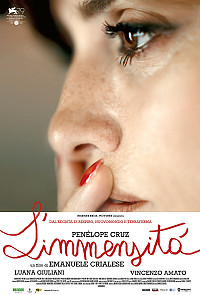 dir Emanuele Crialese scr Emanuele Crialese, Francesca Manieri, Vittorio Moroni prd Lorenzo Gangarossa, Mario Gianani, Dimitri Rassam with Penelope Cruz, Luana Giuliani, Vincenzo Amato, Patrizio Francioni, Maria Chiara Goretti, Penelope Nieto Conti, Alvia Reale, India Santella, Mariangela Granelli, Carlo Gallo, Rita De Donato, Valentina Cenni release It 15.Sep.22, US 12.May.23 22/Italy  SUNDANCE FILM FEST Now streaming... |
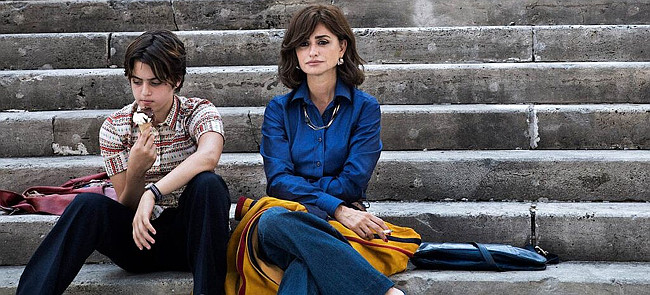 Lively ripples of meaning flow through this Italian drama, working their way under the skin because they are never shouted loudly. Recounting an autobiographical story with evocative detail, filmmaker Emanuele Crialese is adept at isolating the identity of characters grappling with a society that crushes diversity. And it features a remarkably textured performance from young Luana Giuliani, who holds her own against the irresistible magic of Penelope Cruz. In 1970s Italy, teen Adri (Giuliani) wants people to call her by a more masculine name, and finds herself drawn to other girls. Meanwhile, her cheeky younger siblings (Francioni and Goretti) play their roles in the family without question. But their father Felice (Amato) hates how mum Clara (Cruz) rocks the boat with her life-loving childishness. Then Clara becomes worried when Adri begins to fall for Sara (Conti), a girl in the nearby Roma encampment. And Adri can't stop imagining how nice it would feel to be the leading man in her own life story. Crialese continually reveals deeper meanings in striking fantasy sequences, building from the opening sing-song Clara leads as she and the kids set the table. Because everything is seen through Adri's eyes, characters like Clara are heightened while the demanding, repressed Felice lurks menacingly. And events take on specific meanings in light of Adri's yearning to be herself and for everyone around her to see her as she does. Cleverly, Crialese never gets ahead of her story, leaving it as an idea in her mind that is just beginning to blossom into reality. Even with the stylised characters, performances are remarkably honest, creating an unusual slice-of-life quality. The film is dominated by Cruz's beautifully layered turn as a woman others worry is too free even as she struggles with social hypocrisy and her own ingrained bigotry. By contrast, Amato's Felice is almost a monster. And Giuliani provides the story's soul as an expressive, intelligent girl who feels like an alien, wondering why her parents "made me wrong". Activists for trans causes might bristle that the story doesn't continue further, but Crialese is inventively isolating a specific moment in time when the world shifted on its axis for him. Depicted as small incidents and fantasies in a much bigger story, the film overflows with feelings rarely depicted on-screen. So even if things drag a bit in the final act, Crialese finds insight and inspiration in unexpected places, while calling out the nonsensical rules we make for ourselves.
| ||||
|
Lunana: A Yak in the Classroom Review by Rich Cline | 
| |||||
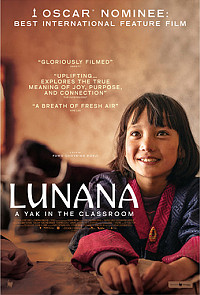 dir-scr Pawo Choyning Dorji prd Pawo Choyning Dorji, Jia Honglin, Stephanie Lai, Steven Xiang with Sherab Dorji, Ugyen Norbu Lhendup, Kelden Lhamo Gurung, Pem Zam, Kunzang Wangdi, Tsheri Zom, Tshering Dorji, Sonam Tashi, Tandin Sonam, Chimi Dem, Tashi Dema, Sangay Lham, Dophu release Bh Feb.20, US 21.Jan.22, UK 10.Mar.23 19/Bhutan 1h49  Is it streaming? |
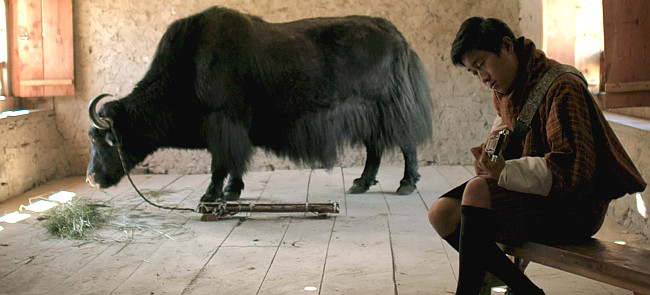 A wonderful story told with humour and visual panache, this film transports the audience an extremely isolated village remaining strikingly resonant. Shot in mountainous Bhutan by filmmaker Pawo Choyning Dorji, this is a warm and involving exploration of the clash between community and individualism, pitting an ancient culture against modern aspirations. And with its terrific cast of characters, the movie feels like it's a gift to the world. In Bhutan's capital city Thimpu, jaded young schoolteacher Ugyen (Dorji) lives with his grandmother (Zom) and dreams of life as a singer in Australia. But his education requires another year of government service and, because of his dismissive attitude, he is sent to the nation's most remote school in Lunana, population 56. Welcomed by village headman Asha (Wangdi), Ugyen is gradually won over by the lively students. And he begins to fall for Saldon (Gurung), a yak herder with a beautiful singing voice who gives him the ageing yak Norbu to keep in his classroom. With its gently pacey narrative and a collection of vivid, often amusing characters, it's perhaps impossible not to fall in love with this movie. Big themes are handled with an unusually light touch, avoiding both cliches and the predicted story structure. So the focus falls refreshingly on interaction that continually breaks the surface. Watching Ugyen blossom from a sullen urbanite into someone deeply connected with his culture and surroundings is unusually inspiring because the script never cheapens his journey. In the lead role, Dorji is thoroughly engaging, revealing how being separated from his electronic devices forces Ugyen to see what's right in front of him. As his curiosity and compassion are piqued, he begins to understand himself more clearly. And the villagers are also superbly well-played, investing real-life wit into each role. All of them are shameless scene-stealers, even as they remain grounded in documentary-style authenticity. Even Norbu the yak wins us over. Writer-director Dorji finds a terrific balance between spectacular scenery and more earthy realism, honing in on the humanity in these people who live far from what we usually think of as global society. It's fascinating to see how the locals weave their lives together with their yaks, from the impassioned songs to the dung they use to start their fires. Indeed, their hopes and dreams are basically far more genuine versions of our own, and can perhaps offer us lessons in how to find happiness and contentment.
| ||||
|
Other People’s Children Les Enfants des Autres Review by Rich Cline | 
| |||||
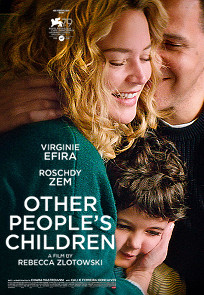 dir-scr Rebecca Zlotowski prd Frederic Jouve with Virginie Efira, Roschdy Zem, Callie Ferreira-Goncalves, Chiara Mastroianni, Victor Lefebvre, Yamee Couture, Henri-Noel Tabary, Anne Berest, Antonia Buresi, Mireille Perrier, Michel Zlotowski, Frederick Wiseman release Fr 21.Sep.22, UK 17.Mar.23, US 21.Apr.23 22/France 1h43  TORONTO FILM FEST SUNDANCE FILM FEST Is it streaming? |
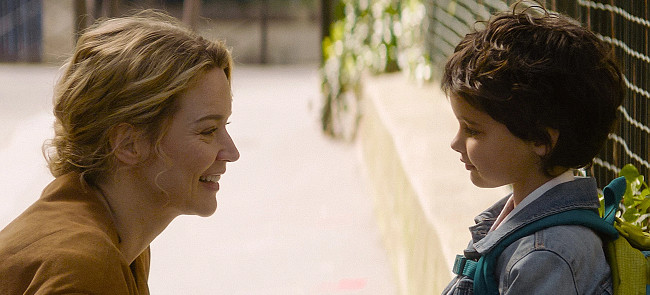 Intrusive music and unsympathetic characters make this pointedly observant French drama difficult to like. Writer-director Rebecca Zlotowski is exploring the resonant feelings of a woman who wants her own kids but may only ever be a stepmum. Frustratingly, the carefully constructed script uses situations simplistically to punch the theme from various angles. And while the protagonist is a music teacher, the unnecessarily over-emotive score steamrolls any possible nuance. At a musical rehearsal, Rachel (Efira) meets Ali (Zem), and they immediately hit it off. Soon, Ali's ex Alice (Mastroianni) grants permission for Rachel to meet energetic 5-year-old daughter Leila (Ferreira-Goncalves). And over the months, Ali and Leila become her whole life. Rachel's doctor (Wiseman) tells her she's reached the limit for having biological children. So she thinks she has missed her chance, just as her little sister Louana (Couture) gets pregnant. But the real problem is that Rachel finds it difficult to coparent a child with Alice, especially when Alice still wants Ali back. Shot in a kinetic documentary style, the film is talky and insistent right from a frantic opening sequence that sees Rachel racing from class to a meeting to a lesson. Pauses are brief before shifting to a spicy sexual encounter or another playful/tense encounter with Leila. Even driving a car is heightened by a deluge. Zlotowski maintains this abrasive tone all the way through the film, which forces us to think about the issues. But it also drives a wedge between us and the narrative. Efira fearlessly embraces the character's more prickly traits. Rachel is flippant, pushy and smug, and only slightly softened by her swelling romance with Zem's patient, likeable Ali. She remains tense and distant, insecure about her place in Leila's life and jealous that her sister is expecting a child. She may be trying, such as when she reaches out to a needy student (Lefebvre), but her motives are dubious. By contrast, other characters feel more realistically layered, easier to identify with in their messiness. Zlotowski's script throws so much at Rachel that it's almost overwhelming, from her jagged but improving connection with Leila to Alice's sudden request to rekindle a relationship with Ali. Because of the film's loud and busy approach, some major shifts happen so quickly that they don't feel fully organic. All of this works together to make it difficult to feel the big emotions that swell up as Rachel yearns to be a mother. But it's worth hanging in there for a strong final point.
| ||||

See also: SHADOWS FILM FESTIVAL © 2023 by Rich Cline, Shadows
on the Wall
HOME | REVIEWS | NEWS | FESTIVAL | AWARDS
| Q&A | ABOUT | TALKBACK | | ||||

